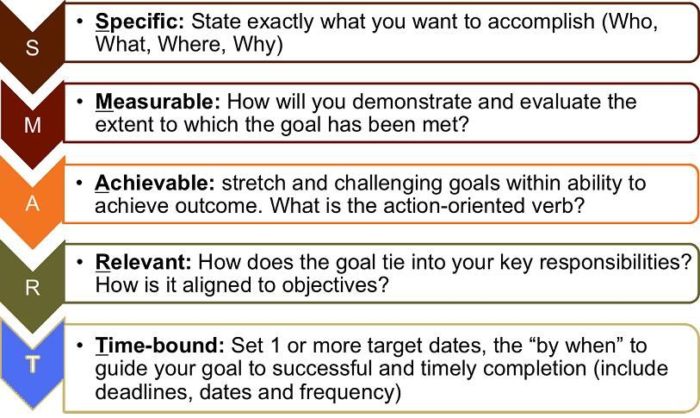
SMART Goals and How to Use Them
You may have heard the term ‘SMART goal’ before; it’s a mnemonic acronym normally used in marketing, but it can be used to your advantage when applied to other things, as well. When you have clearly defined objectives and a realistic approach to a project, it’s much easier to achieve it.
Let’s break down what SMART means:
What the SMART Acronym Stands For

Specific – specify your goal, the what, where and when. This helps narrow things down. What needs to be accomplished, who is responsible, and what are the steps you will need to take to achieve said goal?
- Example: I want to finish my essay by the end of the week, while I have some time off.
Measurable – attach metrics to help measure your successes and work towards your final goal, this is the planning element.
- Example: I need 1,500 more words to complete my essay. I need to break down my time into bite-sized chunks that will work around my word count.
Achievable – break down your goal and think about how you will achieve said goal. Ask if you can reasonably achieve what you have set out to do – is it realistic for your skillset and timeframe?
- Example: If I can manage a minimum of 300 words each evening this week, I’ll have enough words by Friday. I need to put aside x hours this week in order to manage this goal, I work best an hour at a time and once I get things started, it’s likely I’ll go above my word minimum.
Relevant – ask the question, does this goal align with what you need to be doing, does it keep you on track? Really think about the why element.
- Example: I need to finish this assignment in order to complete my course. These steps will help me reach my goal.
Time-bound – set a deadline target that helps you make smaller steps toward your final goal over time. Remember to keep it achievable and don’t strive too high.
- Example: The first draft for my essay needs to be done by Friday, so I can edit it and submit on Saturday.
Remember that setting a deadline does not have to be last minute – it can help trick our brains into getting these tasks done faster!
Why are SMART goals so important?
When you use these characteristics against your goal, you’re increasing the odds for success – with accountability! You’re saying you can do ‘X’ and measure it in ‘X’ ways by ‘X’ time. The initial goal ‘I need to finish my assignment’ is vague and at times overwhelming – breaking it down into reasonable, measurable pieces will help it appear much more manageable.
How SMART goals help:
- By setting clear intentions.
- Provide you with a framework for success, especially if you’re setting benchmarks.
- Gives you sensible objectives (achievable and realistic goals).
- Focus on the important work – and cut out any unnecessary work that may distract from the goal.
- Set a clear start and end, which adds to accountability.
It can take time to grow used to the idea of SMART goals, but in the long run it’s a useful asset for success. Try the SMART approach for yourself, and see what results you achieve!
If you need help setting SMART goals, perhaps you should get in touch with PASS@UNE.
PASS@UNE is an academic assistance program facilitated by students, which targets traditionally difficult units. If you want to chat with the team you can contact them here.


